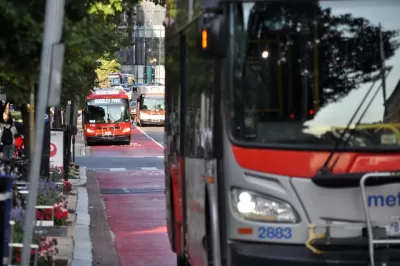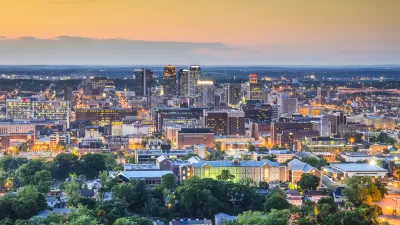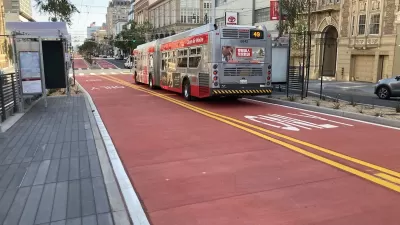The kit, designed in collaboration with five U.S. cities, aims to provide lessons and tools for building a compelling case for bus priority and identifying measurable benefits.

The Natural Resources Defense Council (NRDC) and the Bloomberg Philanthropies American Cities Climate Challenge have released a Bus Priority Toolkit "created jointly with Nelson\Nygaard, NACTO, and the cities of Atlanta, Honolulu, Los Angeles, Portland, Ore., and Washington, D.C.," write Zak Accuardi and Jordan Fraade. The toolkit is designed "to help planners and policy makers at cities and transit agencies solve two key two key bus priority implementation challenges: 1) Building the case for bus priority infrastructure by identifying effective ways to tell the story about why bus priority measures are key tools for climate, transportation access, and equity; and 2) Evaluating the benefits and performance of bus priority measures once they have been implemented."
"Dedicated bus lanes and other transit priority measures are becoming increasingly common in the U.S., but cities working to implement them in recent years have often faced similar challenges as they work to scale up impact from small, one-off projects to comprehensive investments." Because of this, "implementation is easier when cities and transit advocates can communicate the benefits of bus priority measures as part of a clear and compelling story" with a "rigorous performance measurement strategy."
According to the authors, "[t]he technology isn’t complicated, and what’s often missing is simply a compelling narrative, a strategy to measure and communicate the positive benefits, and political will." The kit "provides graphic elements to help tell the story of the benefits of bus priority projects as well as analytic methods for use by city and transit agency staff."
FULL STORY: New Toolkit Supports Bus Priority Implementation

Planetizen Federal Action Tracker
A weekly monitor of how Trump’s orders and actions are impacting planners and planning in America.

Congressman Proposes Bill to Rename DC Metro “Trump Train”
The Make Autorail Great Again Act would withhold federal funding to the system until the Washington Metropolitan Area Transit Authority (WMATA), rebrands as the Washington Metropolitan Authority for Greater Access (WMAGA).

The Simple Legislative Tool Transforming Vacant Downtowns
In California, Michigan and Georgia, an easy win is bringing dollars — and delight — back to city centers.

Albuquerque’s Microtransit: A Planner’s Answer to Food Access Gaps
New microtransit vans in Albuquerque aim to close food access gaps by linking low-income areas to grocery stores, cutting travel times by 30 percent and offering planners a scalable model for equity-focused transit.

This City Will Pay You to Meet Your Neighbors
A North Kansas City grant program offers up to $400 for residents to throw neighborhood block parties.

Commentary: Our Silence Will Not Protect Us
Keeping our heads down and our language inoffensive is not the right response to the times we’re in. Solidarity and courage is.
Urban Design for Planners 1: Software Tools
This six-course series explores essential urban design concepts using open source software and equips planners with the tools they need to participate fully in the urban design process.
Planning for Universal Design
Learn the tools for implementing Universal Design in planning regulations.
Smith Gee Studio
City of Charlotte
City of Camden Redevelopment Agency
City of Astoria
Transportation Research & Education Center (TREC) at Portland State University
US High Speed Rail Association
City of Camden Redevelopment Agency
Municipality of Princeton (NJ)





























